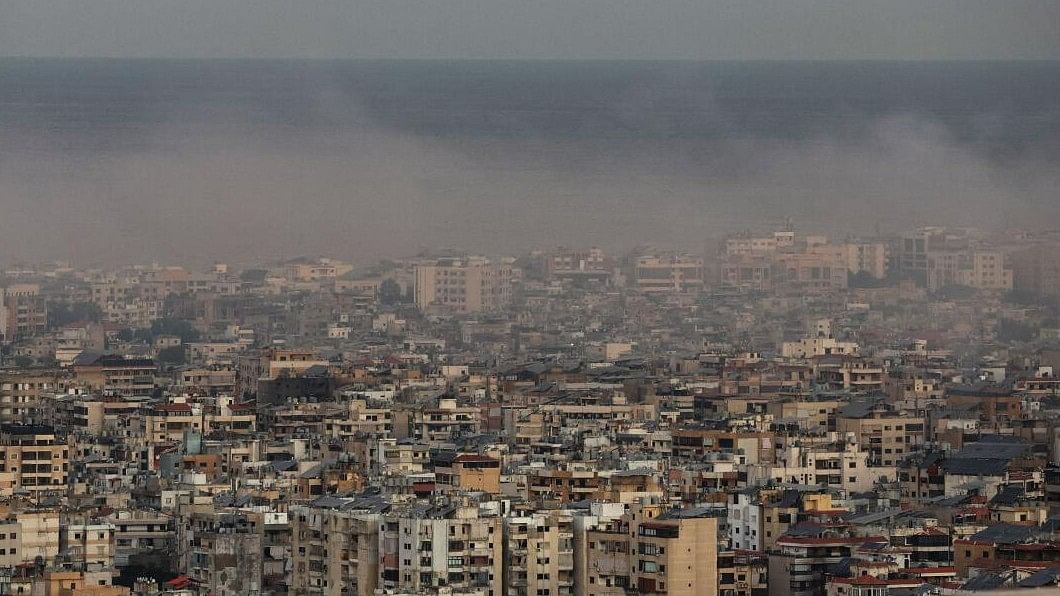
Smoke billows over Beirut's southern suburbs after an Israeli strike, amid the ongoing hostilities between Hezbollah and Israeli forces.
Credit: Reuters Photo
The Israeli military conducted a wave of airstrikes across Lebanon on Sunday, targeting branches of Al-Qard al-Hasan, a financial association associated with the militant group Hezbollah.
The organization was placed under US sanctions in 2007 and has been accused by American, Israeli, Saudi Arabian and other officials of operating as Hezbollah's de facto banking arm. Inside Lebanon, where Hezbollah also functions as a political organization and provides a range of social services, Al-Qard al-Hasan is designated a non-governmental organization and is viewed as a Hezbollah-affiliated charity.
It operates as a lender and financial services provider for civilians in many areas of Lebanon, where the traditional banking sector is in shambles. Many of its branches are situated on the ground floors of residential buildings, and it is deeply embedded in the Shiite Muslim communities it serves.
On social media Sunday night, Avichay Adraee, the Arabic spokesperson for the Israeli military, warned residents of Lebanon to evacuate buildings near the infrastructure of Al-Qard al-Hasan around Beirut and across southern and eastern Lebanon, saying that the organization "is involved in financing the terrorist activities of the Hezbollah organization against Israel."
Soon after, the sounds of explosions could be heard ringing across Beirut, the Lebanese capital. A New York Times reporter saw dense plumes of black smoke rising in the near distance after the strikes.
The strikes marked an apparent escalation of Israel's war against Hezbollah, with a senior Israel intelligence official saying the targeting of the banking system -- rather than weapons depots or command and intelligence centers -- was intended to disrupt Hezbollah's day-to-day operations, undermine its support in Lebanese communities and hamper its ability to rebuild.
The financial organization has about 30 branches across Lebanon, including in the Dahiya, a densely packed area adjoining Beirut where Hezbollah holds sway.
Israel, the United States and others say the group, despite its stated aims, serves as a front for Hezbollah financing. The group "purports to serve the Lebanese people" but in practice "illicitly moves funds through shell accounts and facilitators," the Treasury Department said in 2021 when it was sanctioning individuals involved in what it called Hezbollah's "shadow banking" network.
"In the coming days, we will reveal how Iran funds Hezbollah's terror activities by using civilian institutions, associations, and NGOs that act as fronts for terrorism," Rear Adm. Daniel Hagari, the Israeli military's chief spokesperson, said in a statement Sunday evening.
Critics of the group say the organization allows Hezbollah to build up its influence with citizens in Lebanon while hobbling the state and putting Lebanon's banks at risk of foreign sanctions.
A senior Israeli official speaking on condition of anonymity to discuss sensitive matters said Israel seeks to disrupt Hezbollah's day-to-day financial operations, including paying salaries of Hezbollah's operatives, which all run through Al-Qard al-Hasan, and to undermine the trust between Hezbollah and the many Lebanese Shiite Muslims who use the branches as an alternative banking service.
Al-Qard al-Hasan said in a statement Sunday that Israel had exhausted "its bank of objectives and has chosen to threaten and target Al-Qard al-Hasan, the non-profit organization."
Lebanon is still reeling from a severe financial and economic crisis that began in 2019.
In October of that year, the country was rocked with protests calling for a new government, leading to the prime minister's resignation.
But the government and the country have yet to recover -- and the financial crisis was exacerbated in the years that followed, first by the Covid-19 pandemic, and then by a massive explosion in the port of Beirut in the summer of 2020. Desperate Lebanese citizens have at times even tried to hold up banks where they are customers in an effort to get their money.
Last year, Hezbollah began launching attacks at Israel in solidarity with Hamas after that group's Oct 7 attacks on Israel that ignited the war in the Gaza Strip. Israel and Hezbollah traded fire for many months in a steady exchange of strikes that seemed, until last month, to be designed to avoid an all-out war.
But Israel in September stepped up its attacks against Hezbollah, targeting its commanders and infrastructure in a series of intense strikes in and near Beirut and throughout southern Lebanon; more than 2,400 people have been killed in Lebanon since October 2023, with the vast majority of those deaths occurring during the recent uptick in Israeli attacks. In October, Israel also launched a ground invasion into southern Lebanon that has led to the displacement of about a million people in Lebanon, according to local authorities.
On Sunday, residents of areas near branches of Al-Qard al-Hasan began fleeing after the evacuation warnings from Israel. Fatima Jneideh said she had evacuated her home just a few meters from a branch location in the Dahiya, an area near Beirut where Hezbollah holds sway. "My brother is still home," she said. "He refused to leave."